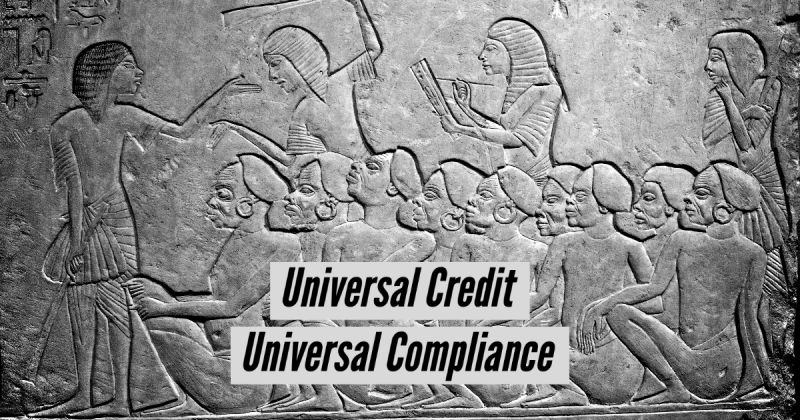11th October 2017 | By Simon Duffy
My perspective on the unfolding disaster of Tory (non) welfare reform.

I was recently interviewed by occupy.com about Universal Credit. Here's my perspective on the next unfolding disaster of Tory (non) welfare reform.
Universal Credit (UC) is being criticised as a “one size fits all” scheme which doesn’t work. To what extent do you think this is true?
Universal Credit is an example of the worst kind of policy: a bad idea, badly implemented. It is a bad idea because it wrongly assumes that the best response to growing poverty, job insecurity and low pay is to continue to reduce the value of benefits, whilst making those benefits less secure. It is inevitably difficult to implement because it involves integrating information about benefits with information about salaries and other income without integrating the relevant Government departments: DWP and HMRC. All governments have a terrible record in developing computer systems, but developing a system to bridge two different Government Departments is begging for failure.
With monthly payments in arrears, an official waiting period of six weeks for a first payment (although 24% of claimants have reported waiting 10 or more weeks), and many claimants experiencing or set to experience a huge drop in income, Universal Credit can plunge those without savings or a safety net into dangerous levels of poverty and debt. Food banks in areas where UC has already been rolled out have reported a dramatic spike in user numbers. How do you feel about the announcement at Conservative Party conference that the government will issue advance payments to those who end up in crisis because of UC, but ask them to pay back the amount out of future UC payments?
The Government is in denial about the reality of severe deprivation in the UK. Any delays in income will push many people who are already living in poverty and debt into extreme distress. It is a sign of how far our standards of decency have declined that, having previously stripped DWP officers of the ability to use their discretion to provide benefits, that discretion is now being returned to them, but only to give out loans. It is also an indictment of modern Britain, where public and private indebtedness is rife, that the solution to every problem is to create more debt.To what extent do you think Universal Credit is encouraging, and will encourage, people into “in-work poverty”?
In-work poverty is already normal and in fact the changing nature of our economy means that almost all families are now reliant on some form of social security to sustain their income. Universal Credit is designed to increase the expectation that families should work for low wages, for minimum hours and on temporary or zero-hours contracts. The long-term aim of Universal Credit is to create millions of compliant workers, whose income and source of income will vary from week to week, depending on the state of the local economy. This class of workers will now have to keep the state constantly updated about the state of their home, their family life, income and any other activities.Can you talk a little about the impact of the Universal Credit roll-out on child support?
It perhaps seems extraordinary that, with 1 in 3 children in the UK already living in poverty, the Government’s key welfare reform will only make things worse. However this is to be expected given that this policy follows a series of changes that have reduced benefits for families, including families with disabled children. In a country with a birth rate which is too low to maintain its population, but which is also opposed to immigration, this anti-family policy may seem paradoxical. However the Government’s key supporters are the wealthy and the elderly; the future of the country does not seem to be their primary concern.
What about its impact on housing and homelessness?
Universal Credit extends further the UK’s flawed approach to housing by treating housing as merely an additional household cost. It ignores the fact that housing is a distinct and absolute social right. It ignores the reality of the unequal distribution of land and property, which is the fundamental injustice that underpins homelessness and the high cost of rented housing. It ignores the realities of family and community life. Instead housing become just one additional element within the calculation of entitlement. The shift to Universal Credit will worsen homelessness, particularly as many people will not be able to cope with being locked into a client relationship with the state; they will opt out and try to cope without support. The new direct payment arrangements will also encourage others not to pay their rent as their income is reduced; they will then get into arrears and become homeless.
Do you think the government will bow to pressure to halt the roll-out of Universal Credit?
It is hard to judge what the Government will do as the pressure on Universal Credit increases. Since 2010 the Government has been very ‘successful’ in making regular cuts in the overall level of benefits, combined with highly targeted cuts on benefits for disabled people (called ESA and PIP). Initially the Labour Party did not hold the Government to account for these changes; but this has started to change since the election of Jeremy Corbyn. The 2017 election results will also make the current Government more nervous.
However the Conservative leadership has no alternative intellectual position, other than to offer more of the same. There used to be a tradition of thought within the Conservative Party which valued society, community and the family and which was very cautious about treating people as if they were only economic units and which did not want to interfere unduly in the lives of ordinary people. Sadly, this more humane version of Conservatism seems to have died.